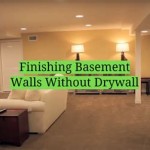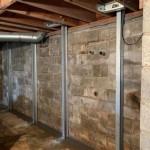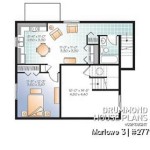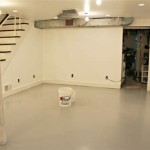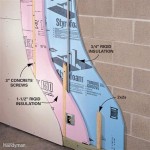Types of Insulation for Basement Walls
Insulating your basement walls is a crucial step in creating a comfortable and energy-efficient living space. With the right type of insulation, you can reduce heat loss, prevent moisture penetration, and improve your overall indoor air quality. Here are the essential aspects you need to consider when choosing the best insulation for your basement walls:
Types of Basement Wall Insulation
There are several types of insulation commonly used for basement walls, each with its unique properties and advantages:
- Batt Insulation: Batt insulation comprises pre-cut fiberglass or mineral wool panels that fit snugly between the wall studs.
- Rigid Foam Insulation: Rigid foam insulation, typically made of polystyrene or polyurethane, comes in rigid sheets that are attached directly to the basement walls.
- Loose-Fill Insulation: Loose-fill insulation, such as cellulose or vermiculite, is blown into the wall cavities through small holes drilled in the wall.
- Spray Foam Insulation: Spray foam insulation is a liquid foam that is sprayed onto the basement walls, expanding and hardening to create a continuous insulating barrier.
Factors to Consider
When selecting insulation for your basement walls, consider the following factors:
- R-Value: The R-value indicates the insulation's resistance to heat flow. Higher R-values provide better insulation.
- Moisture Resistance: Basements are prone to moisture, so choose insulation with high moisture resistance to prevent mold and water damage.
- Cost: Insulation materials vary in cost, so it's essential to balance affordability with the desired level of insulation.
- Installation Method: Consider the ease of installation for the chosen insulation and ensure you have the necessary tools or professional expertise.
Best Insulation for Different Wall Types
The type of wall construction will influence the best insulation choice:
- Concrete Walls: Rigid foam insulation or spray foam insulation works well for concrete walls due to their higher moisture resistance.
- Brick Walls: Batt insulation or loose-fill insulation is suitable for brick walls with cavities or furring strips.
- Wood-Framed Walls: Batt insulation or spray foam insulation are excellent options for wood-framed walls.
Additional Tips
Along with choosing the right insulation, consider these additional tips for effective basement wall insulation:
- Seal Air Leaks: Seal any gaps or cracks in the basement walls to prevent air leakage and heat loss.
- Install a Vapor Barrier: A vapor barrier prevents moisture from penetrating the insulation and causing damage.
- Consider Insulation Thickness: Determine the optimal insulation thickness based on the local climate and the desired level of insulation.
- Hire a Professional: For complex or large-scale insulation projects, hiring a qualified contractor is advisable.
Conclusion
Choosing the right insulation for your basement walls is essential for creating a comfortable, energy-efficient, and healthy living space. By considering the factors discussed above, you can make an informed decision to effectively insulate your basement walls and enjoy its benefits for years to come.

How To Insulate Basement Walls True Value

How To Insulate A Basement Wall Greenbuildingadvisor

Insulating Basement Walls With Fiberglass Batting Semigloss Design

Best Type Of Insulation For Basement Walls

Insulating Basement Walls With Fiberglass Batting Semigloss Design

Basement Wall Insulation Knauf

Insulation 101 Basics Scott Mcgillivray

Adding Insulation To Basement Walls Fine Homebuilding

Healthy Basement Insulation Systems Quality Built Basements Llc

Keeping The Heat In Section 6 Basement Insulation Floors Walls And Crawl Spaces
See Also


